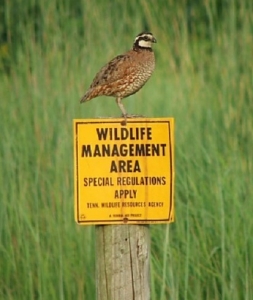Habitat Management
More than 90% of the land in Tennessee is privately owned. To successfully manage our state’s wildlife resources, the Tennessee Wildlife Resources Agency (TWRA) must work cooperatively with private landowners across the state. Many landowners desire property that is welcoming to wildlife species and some may need technical assistance to accomplish their goals and vision.
TWRA has Wildlife Habitat Biologists throughout the state whose primary job is to assist landowners with technical assistance and managing their property for wildlife. See below for a link to these biologists and also to articles on specific management techniques. We’d love to speak to you, visit your property and assist you in reaching your wildlife goals!
Landowner Resources, Contact a Wildlife Habitat Biologist
TWRA has partnered with the USDA Natural Resources Conservation Service (NRCS) for over a decade. This partnership has helped to establish tens of thousands of acres of wildlife habitat in TN through our Wildlife Habitat Biologist and Partner’s positions. The majority of habitat programs and funding are from Farm Bill programs administered through the USDA system. To be most effective, TWRA Wildlife Habitat Biologists and most Quail Forever Farm Bill Biologists are housed within USDA NRCS offices. The map below indicates office locations and contact information for the listed partner biologists, and county colors reflect the four NRCS administrative areas that the TWRA Wildlife Habitat Biologists are assigned to.
Christopher Hunter, TWRA |
Clint Borum, TWRA |
Richard Underwood, TWRA |
Stephen Thomas, TWRA |
|
| Alex Tamboli, Quail Forever Senior Farm Bill Biologist Carroll County, NRCS Field Office 630 High Street Huntingdon, TN 38344 Cell: 662-934-4454 atamboli@quailforever.org |
Josh Breitung, Quail Forever Farm Bill Biologist II Hardeman County, NRCS Field Office 791-B Tennessee Street Bolivar, TN 38008 Cell: 615-881-9606 jbreitung@quailforever.org |
Collin Stanley, Quail Forever Farm Bill Biologist III Obion County, NRCS Field Office 1216 Stad Avenue Union City, TN 38261 Cell: 615-881-9606 cstanley@quailforever.org |
Jacob Taylor, Quail Forever Precision Agriculture Conservation Specialist Madison County, NRCS Field Office 313 N Parkway Jackson, TN 38305 Cell: 731-487-2234 jtaylor@quailforever.org |
|
| Brittney Viers-Scott, Quail Forever & NRCS Tennessee State Coordinator Cell: 731-358-1860 bviers@quailforever.org |
Logan White, Quail Forever Farm Bill Biologist II Sumner County, NRCS Field Office 150 Albert Gallatin Avenue Gallatin, TN 37066 Cell: 845-248-2172 lwhite@quailforever.org |
Jillian Tramel, Quail Forever Grasslands and Grazing Coordinator Robertson County, NRCS Field Office 5024 Highway 41 N Springfield, TN 37172 Cell: 615-491-6593 jtramel@quailforever.org |
Cat Carter, Quail Forever Grasslands Outreach Coordinator Cell: 615-744-9796 ccarter@quailforever.org |
|
Macon Girdley, Quail Forever |
David Lowman, TWRA Habitat Specialist Crew Lead Cumberland County, TWRA Field Office Cell: 615-418-3962 david.lowman@tn.gov |
Paul Underwood, Quail Forever Senior Farm Bill Biologist McMinn County, NRCS Field Office 320 Congress Parkway N Athens, TN 37303 Cell: 865-304-6251 punderwood@quailforever.org |
Bailey Daining, Quail Forever Farm Bill Biologist II Greene County, NRCS Field Office 214 N. College Street, Suite 200 Greeneville, TN 37745 Cell: 865-556-4088 bdaining@quailforever.org |
|
NRCS Partner Foresters |
|
|||
Dustin Stutts |
Jacob Hooker, National Wild Turkey Federation USDA/NRCS Area II 1501 Herbert Lewis Drive Columbia, TN 38401 Cell: 931-777-9416 jhooker@usda.gov |
Kristopher Oja |
||
Additional Contacts
Quail Focal Areas in Tennessee
The northern bobwhite quail is Tennessee’s state game bird and historically was a prominent game bird across the southeastern United States. Unfortunately, due to the large-scale loss of farmland, changes in agriculture, and increases in forest land, quail habitat has been reduced or eliminated. As a result, the northern bobwhite population in the U.S. has been on a decline.
The TWRA has designated five of its wildlife management areas (WMAs) to serve as anchors within a quail focal area (see map below.) They are Wolf River WMA (Fayette County), Bark Camp Barrens WMA (Coffee County), Bridgestone/Firestone Centennial Wilderness WMA (White County), Kyker Bottoms WMA, and Lick Creek Bottoms WMA (Greene County).
The anchor areas act as reserves where wildlife management efforts are focused on maximizing ideal habitat and conditions to foster healthy quail populations. As the quail population increases, it should expand out into the surrounding focus area if suitable habitat exists. The focal area is comprised of private and other public lands that have the potential to provide suitable quail habitat. The Wolf River WMA is a focal area for the National Bobwhite Conservation Initiative, a multistate initiative of 22 states that are working to increase quail numbers.
Landowners interested in improving their lands for quail should contact their local TWRA or Quail Forever Habitat Biologist. These biologists will meet with landowners or property managers and develop a habitat management plan at no charge and provide other advice, such as programs that can provide financial assistance for creating and managing wildlife habitat.
Northern Bobwhite Management in Tennessee
The Northern Bobwhite (Colinus virginianus) is the state game bird of Tennessee and an important part of the state’s landscape and heritage. Northern Bobwhite populations have declined dramatically range-wide since the 1950s, primarily due to landscape-scale habitat conversion and loss.
Tennessee Wildlife Resources Agency (TWRA) collaborates with a myriad of partners to foster robust, self-sustaining Northern Bobwhite populations by enhancing existing and developing new habitats across the state.
The vision of this plan is: To rebuild, manage, and monitor Northern Bobwhite populations in suitable habitats while partnering with stakeholders and continuously evaluating conservation efforts with an adaptive management approach.


